home
A history of Marvel in the 1960s
Patrick Ford
9 September 2016
[1961: DC aimed at young children]
Norris Burroughs:
As a kid growing up in the 60's, raised on DC comics and Bat-Mite, Turtle Jimmy Olsen and other half-witted stupid gibberish, the coming of Marvel blew that crap out of the water. Compare any other contemporary comic to say Fantastic Four Annual #1 or the Galactus trilogy and the other suffers greatly in my estimation. DC came out with books like Doom Patrol in an attempt to emulate what Marvel was innovating. I bought my comics from several news stands in my Bronx neighborhood and there was a major buzz when these books went out. People who were not even serious collectors were buying multiple copies and bagging them. I knew several of these people. Jeff Greenbaum was my neighbor. For this reason, there is to this day a fairly large selection of high grade copies starting in around 1964-1965. When Marvel brought back Captain America, there was an article in Warren's Screen Thrills Illustrated magazine making note of the event particularly as it pertained to the serial. Awareness that characters like Cap, Human Torch and Sub-Mariner originated in the 40's helped set of comic collecting as a major endeavor which developed into the direct market. I was there for the new born collectors market in 1965 onward with people like Phil Sueling and Howard Rogofsky who began selling Golden as well as Silver Age back issues. Prior to 1964 there was barely any market for these things. Just the fact that Heritage is selling slabbed Silver Age books for ridiculous astronomical prices is clear evidence that these comics had a huge impact on the culture at large. Regardless of whether you personally didn't think Marvel was worth a damn, it was a pretty big deal in the Bronx New York, which as far as I'm concerned was cultural ground Zero. This of course does not negate the fact that Stan Lee was a grandstanding credit hound and a crass and vulgar buffoon.
[1961: Lee wanted Kirby's stories to be for young children]
Patrick Ford:
There was nothing remotely intelligent about the dialogue in a Marvel comic book. This can be easily seen by comparing a Marvel comic book to a comic book published by any other publisher. The Marvel books are uniformly written for small children. It's very clear from reading not only the captions and dialogue, but the letters pages and bulletins that Stan Lee knew he was hustling insecure "kiddies."
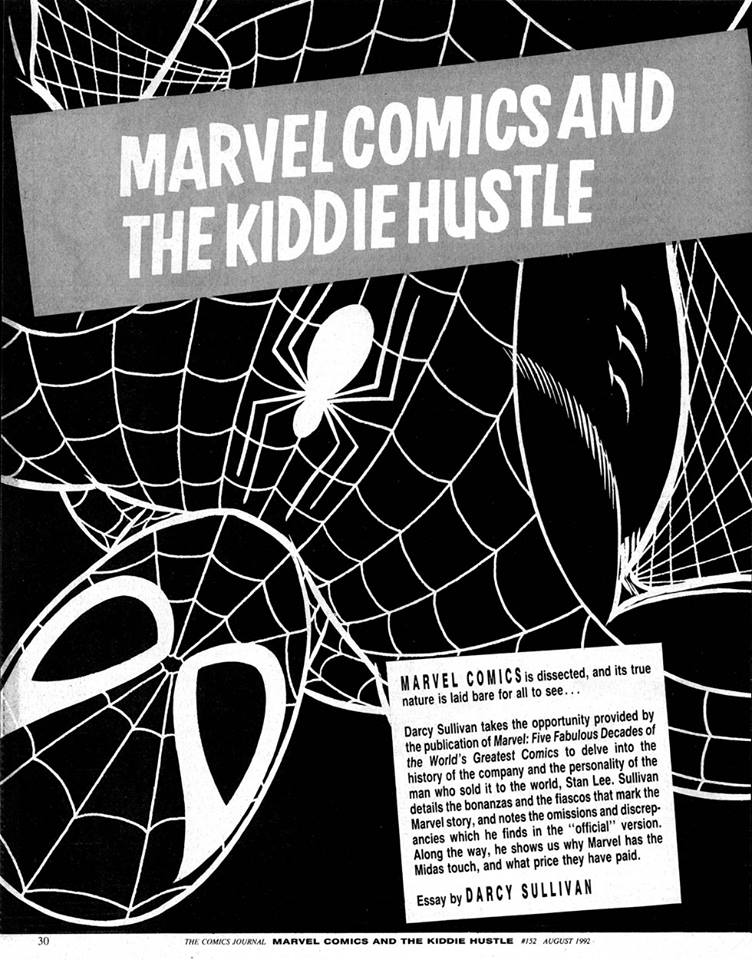
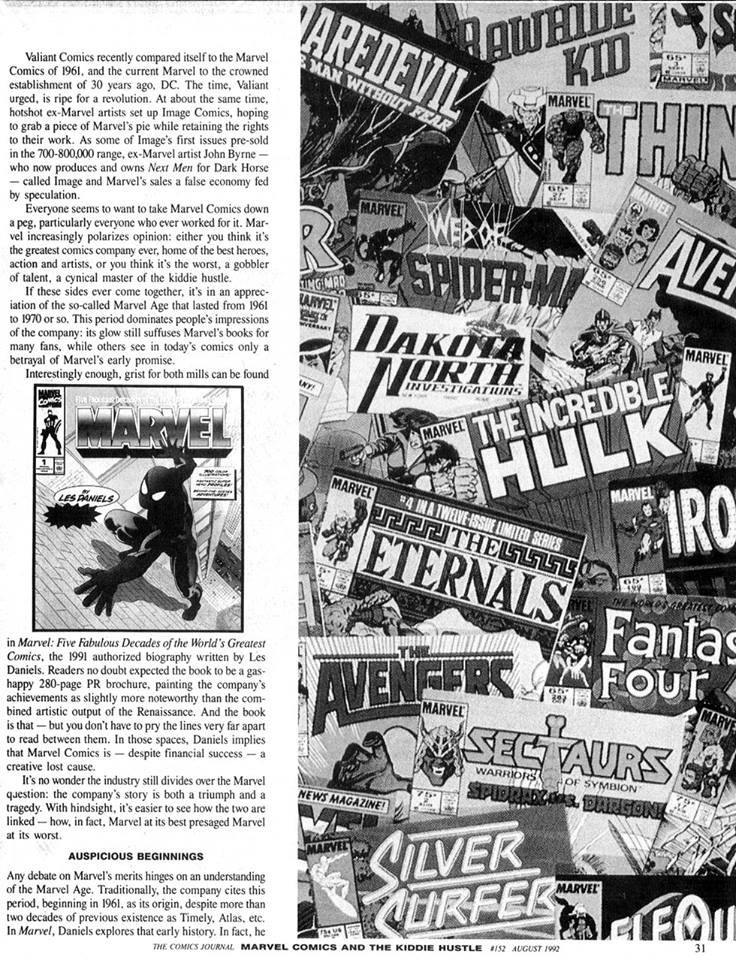
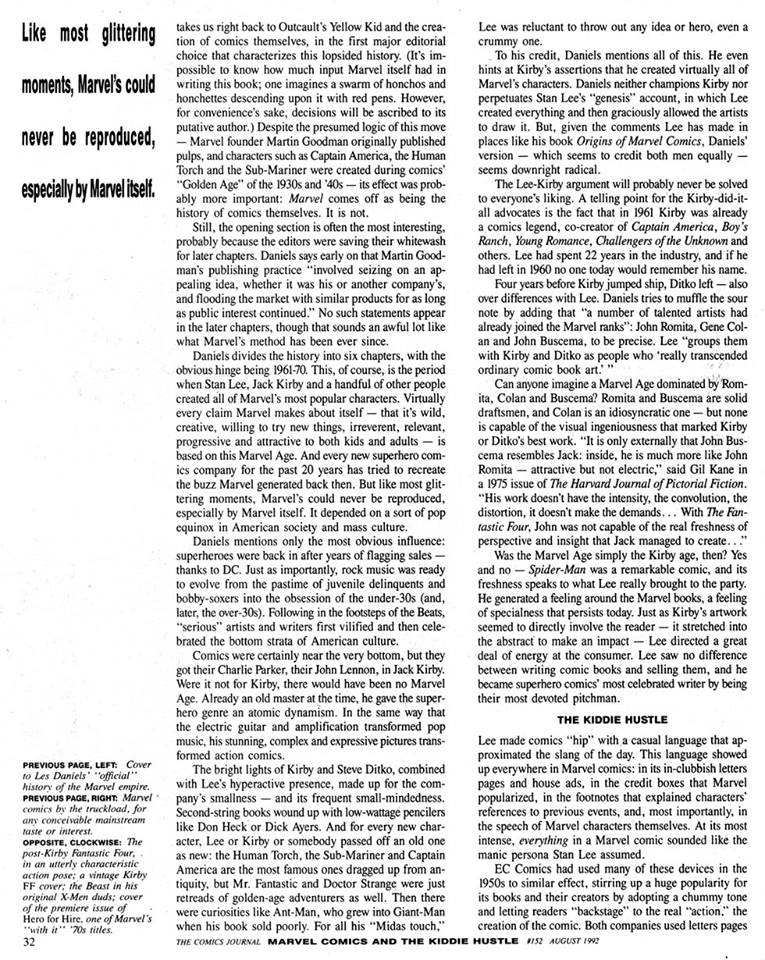

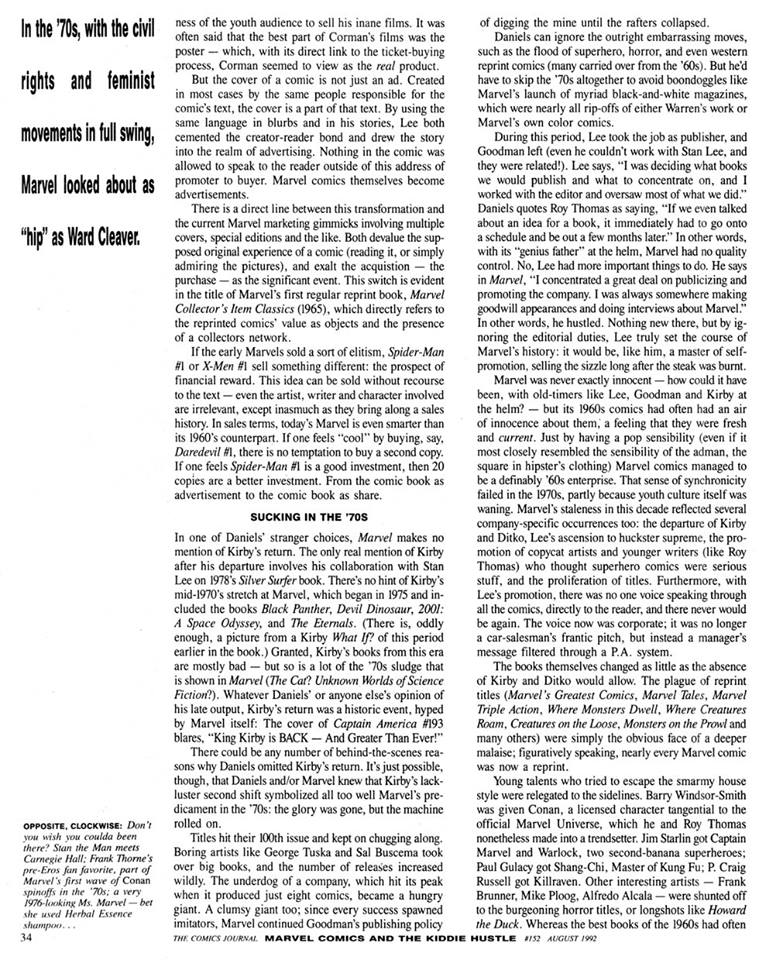
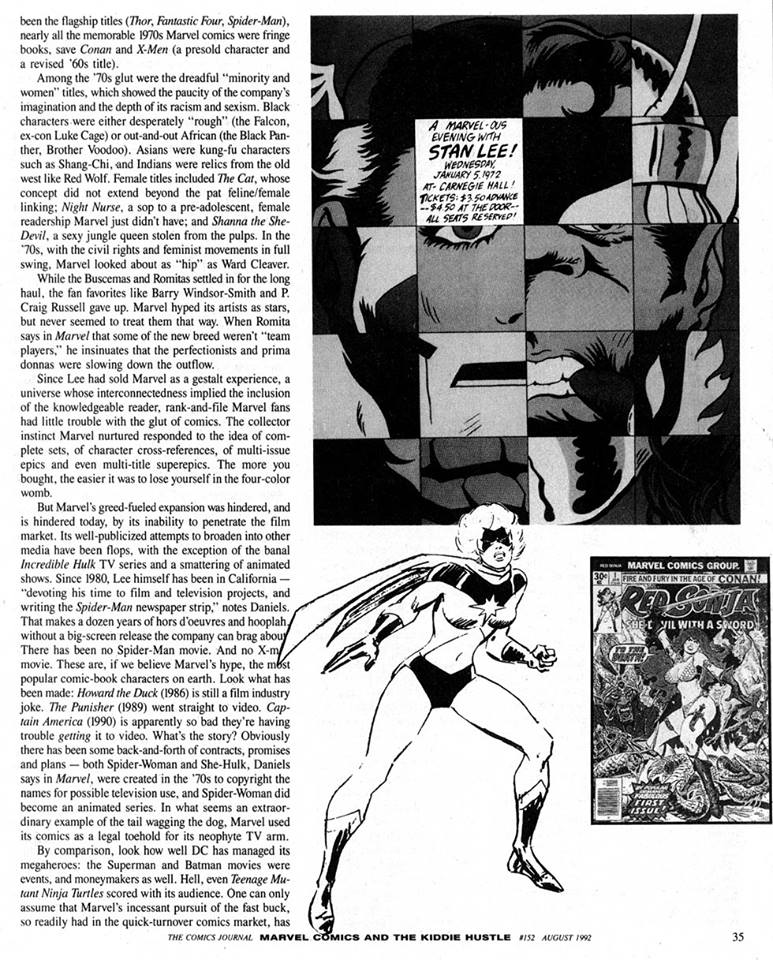


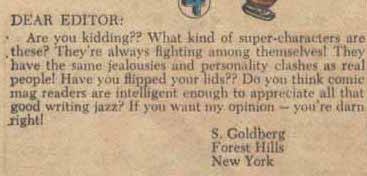
 Darcy Sullivan. MARVEL COMICS AND THE KIDDIE HUSTLE.
[1960-1970: Sales were still poor]
Patrick Ford:
Marvel comics did not sell particularly well in the '60s. They didn't sell as well as DCs best selling titles. Not by a long shot. The super hero did not save or revive the comic book industry. Comics sales in the '60s were awful and by the end of the decade distributors and retailers didn't want to deal with comic books.
Neal Kirby just commented the other day that as a kid growing up none of his friends read comic books and the fact his dad worked for Marvel meant nothing to them.
[1966: The Batman TV show]
Robert Beerbohm:
Being some one "there" inside "organized" comic book fandom placing my first humble little advert in RBCC #47 Oct 1966 age 14 the single most important concept which push glutted the comic book market place was the advent of the Batman TV show. Period.
By 1969 the huge glut had caused a backlash by magazine retailers and distributors to push back on handling 12 cent product hence the hike to 15 cents, then shortly thereafter to 20 cents etc etc
By 1970 super heroic funny books were dying on the vines in the main.
Darcy Sullivan. MARVEL COMICS AND THE KIDDIE HUSTLE.
[1960-1970: Sales were still poor]
Patrick Ford:
Marvel comics did not sell particularly well in the '60s. They didn't sell as well as DCs best selling titles. Not by a long shot. The super hero did not save or revive the comic book industry. Comics sales in the '60s were awful and by the end of the decade distributors and retailers didn't want to deal with comic books.
Neal Kirby just commented the other day that as a kid growing up none of his friends read comic books and the fact his dad worked for Marvel meant nothing to them.
[1966: The Batman TV show]
Robert Beerbohm:
Being some one "there" inside "organized" comic book fandom placing my first humble little advert in RBCC #47 Oct 1966 age 14 the single most important concept which push glutted the comic book market place was the advent of the Batman TV show. Period.
By 1969 the huge glut had caused a backlash by magazine retailers and distributors to push back on handling 12 cent product hence the hike to 15 cents, then shortly thereafter to 20 cents etc etc
By 1970 super heroic funny books were dying on the vines in the main.
 [1970: Superheroes were dying]
Patrick Ford:
If super heroes were so successful at revitalizing the industry why were both DC and Marvel scrambling to try a host of different genres in 1970? Why all the science fiction, horror, romance, Gothic romance, Westerns, sword and sorcery, martial arts titles rather than more super heroes?
And why had comic books become something which retailers and distributors didn't want to deal with?
Robert Beerbohm:
Martin Goodman sold out Marvel ie Magazine Management in 1968 first chance he got during the utter height of the Batman TV show craze comic book glut. Took the money and raaaaan, baby! Also, 1968 the ten year contract begun with Donenfeld & Sampliner's Independent News was up. New distributor - massive over doubling of titles in 1968. etc. I got all sorts of fun data history from George Dougherty Jr who was comic book paper broker 1939-1972. He fronted ALL the paper to Goodman, M & B Gaines, Lev Gleason, Fiction House, Elliott Caplin, S&K on Mainline, Andru & Esposito's MikeRoss, so many others
Robert Beerbohm:
The business history of the comic book on a host of levels is factually incorrect. After having been doing this gig of buying and selling comic books for literally 50 years since my first ad RBCC 47 oct 1966 age 14 the corporate brand names using mass media of the day washed over the efforts of individuals much like Walt Disney was "known" for 'creating' all that stuff which came out of the company which bears his name
Patrick Ford:
Goodman sold because he observed that the bloom was off the rose. That is portrayed as a bone head move and in the long run it was. However, people forget how easily Marvel could have failed and how it nearly did fail and how the company was even bankrupt.
For all Goodman knew in 1968 Spider-Man could easily have ended up like the Lev Gleason Daredevil. A character which had once been far more popular than the Marvel characters and which has not earned a dime in around 70 years.
Robert Beerbohm:
Marvel Comics was bankrupt a few times over the decades. Distribution as in getting product out to market for lost souls to fork over their bucks is the real story. That old adage, If a tree fell in a forest and no one heard, did it make a sound. :)
Patrick Ford:
Look at all the popular culture fixtures which are almost worthless today. When is the last time there was a Roy Rogers and Trigger lunchbox? How come you never hear about Barney Google anymore? Do people have any idea how big the comic strip The Gumps was?
No one could have logically know that for some reason these super hero movies would click.
Robert Beerbohm:
Popular culture characters evolve over the decades. Adapt or die as they say. In fairness the Roy Rogers museum in southern Calif out in the Mojave Desert was in existence till about a decade or so ago. I pit stopped there a couple times. I still regularly trickle out Roy Rogers, Lone Ranger, Hopalong Cassidy, Red Ryder, Cisco Kid, Zorro comics amongst other westerns plus output from DC, Marvel Atlas, etc
Wizard of Oz is still running off & on in popularity and it dates to late 1890s.
The Gumps begun by Sidney Smith out of Old Doc Yak sunday page is a world unto itself :) I have a lot of Doc Yak SUnday pages dating back to 1912 or so plus a number of Gumps Sundays which reside in my collections on the backs of other stuff I like better.
[1970: Superheroes were dying]
Patrick Ford:
If super heroes were so successful at revitalizing the industry why were both DC and Marvel scrambling to try a host of different genres in 1970? Why all the science fiction, horror, romance, Gothic romance, Westerns, sword and sorcery, martial arts titles rather than more super heroes?
And why had comic books become something which retailers and distributors didn't want to deal with?
Robert Beerbohm:
Martin Goodman sold out Marvel ie Magazine Management in 1968 first chance he got during the utter height of the Batman TV show craze comic book glut. Took the money and raaaaan, baby! Also, 1968 the ten year contract begun with Donenfeld & Sampliner's Independent News was up. New distributor - massive over doubling of titles in 1968. etc. I got all sorts of fun data history from George Dougherty Jr who was comic book paper broker 1939-1972. He fronted ALL the paper to Goodman, M & B Gaines, Lev Gleason, Fiction House, Elliott Caplin, S&K on Mainline, Andru & Esposito's MikeRoss, so many others
Robert Beerbohm:
The business history of the comic book on a host of levels is factually incorrect. After having been doing this gig of buying and selling comic books for literally 50 years since my first ad RBCC 47 oct 1966 age 14 the corporate brand names using mass media of the day washed over the efforts of individuals much like Walt Disney was "known" for 'creating' all that stuff which came out of the company which bears his name
Patrick Ford:
Goodman sold because he observed that the bloom was off the rose. That is portrayed as a bone head move and in the long run it was. However, people forget how easily Marvel could have failed and how it nearly did fail and how the company was even bankrupt.
For all Goodman knew in 1968 Spider-Man could easily have ended up like the Lev Gleason Daredevil. A character which had once been far more popular than the Marvel characters and which has not earned a dime in around 70 years.
Robert Beerbohm:
Marvel Comics was bankrupt a few times over the decades. Distribution as in getting product out to market for lost souls to fork over their bucks is the real story. That old adage, If a tree fell in a forest and no one heard, did it make a sound. :)
Patrick Ford:
Look at all the popular culture fixtures which are almost worthless today. When is the last time there was a Roy Rogers and Trigger lunchbox? How come you never hear about Barney Google anymore? Do people have any idea how big the comic strip The Gumps was?
No one could have logically know that for some reason these super hero movies would click.
Robert Beerbohm:
Popular culture characters evolve over the decades. Adapt or die as they say. In fairness the Roy Rogers museum in southern Calif out in the Mojave Desert was in existence till about a decade or so ago. I pit stopped there a couple times. I still regularly trickle out Roy Rogers, Lone Ranger, Hopalong Cassidy, Red Ryder, Cisco Kid, Zorro comics amongst other westerns plus output from DC, Marvel Atlas, etc
Wizard of Oz is still running off & on in popularity and it dates to late 1890s.
The Gumps begun by Sidney Smith out of Old Doc Yak sunday page is a world unto itself :) I have a lot of Doc Yak SUnday pages dating back to 1912 or so plus a number of Gumps Sundays which reside in my collections on the backs of other stuff I like better.
home









 Darcy Sullivan. MARVEL COMICS AND THE KIDDIE HUSTLE.
[1960-1970: Sales were still poor]
Patrick Ford:
Marvel comics did not sell particularly well in the '60s. They didn't sell as well as DCs best selling titles. Not by a long shot. The super hero did not save or revive the comic book industry. Comics sales in the '60s were awful and by the end of the decade distributors and retailers didn't want to deal with comic books.
Neal Kirby just commented the other day that as a kid growing up none of his friends read comic books and the fact his dad worked for Marvel meant nothing to them.
[1966: The Batman TV show]
Robert Beerbohm:
Being some one "there" inside "organized" comic book fandom placing my first humble little advert in RBCC #47 Oct 1966 age 14 the single most important concept which push glutted the comic book market place was the advent of the Batman TV show. Period.
By 1969 the huge glut had caused a backlash by magazine retailers and distributors to push back on handling 12 cent product hence the hike to 15 cents, then shortly thereafter to 20 cents etc etc
By 1970 super heroic funny books were dying on the vines in the main.
Darcy Sullivan. MARVEL COMICS AND THE KIDDIE HUSTLE.
[1960-1970: Sales were still poor]
Patrick Ford:
Marvel comics did not sell particularly well in the '60s. They didn't sell as well as DCs best selling titles. Not by a long shot. The super hero did not save or revive the comic book industry. Comics sales in the '60s were awful and by the end of the decade distributors and retailers didn't want to deal with comic books.
Neal Kirby just commented the other day that as a kid growing up none of his friends read comic books and the fact his dad worked for Marvel meant nothing to them.
[1966: The Batman TV show]
Robert Beerbohm:
Being some one "there" inside "organized" comic book fandom placing my first humble little advert in RBCC #47 Oct 1966 age 14 the single most important concept which push glutted the comic book market place was the advent of the Batman TV show. Period.
By 1969 the huge glut had caused a backlash by magazine retailers and distributors to push back on handling 12 cent product hence the hike to 15 cents, then shortly thereafter to 20 cents etc etc
By 1970 super heroic funny books were dying on the vines in the main.
 [1970: Superheroes were dying]
Patrick Ford:
If super heroes were so successful at revitalizing the industry why were both DC and Marvel scrambling to try a host of different genres in 1970? Why all the science fiction, horror, romance, Gothic romance, Westerns, sword and sorcery, martial arts titles rather than more super heroes?
And why had comic books become something which retailers and distributors didn't want to deal with?
Robert Beerbohm:
Martin Goodman sold out Marvel ie Magazine Management in 1968 first chance he got during the utter height of the Batman TV show craze comic book glut. Took the money and raaaaan, baby! Also, 1968 the ten year contract begun with Donenfeld & Sampliner's Independent News was up. New distributor - massive over doubling of titles in 1968. etc. I got all sorts of fun data history from George Dougherty Jr who was comic book paper broker 1939-1972. He fronted ALL the paper to Goodman, M & B Gaines, Lev Gleason, Fiction House, Elliott Caplin, S&K on Mainline, Andru & Esposito's MikeRoss, so many others
Robert Beerbohm:
The business history of the comic book on a host of levels is factually incorrect. After having been doing this gig of buying and selling comic books for literally 50 years since my first ad RBCC 47 oct 1966 age 14 the corporate brand names using mass media of the day washed over the efforts of individuals much like Walt Disney was "known" for 'creating' all that stuff which came out of the company which bears his name
Patrick Ford:
Goodman sold because he observed that the bloom was off the rose. That is portrayed as a bone head move and in the long run it was. However, people forget how easily Marvel could have failed and how it nearly did fail and how the company was even bankrupt.
For all Goodman knew in 1968 Spider-Man could easily have ended up like the Lev Gleason Daredevil. A character which had once been far more popular than the Marvel characters and which has not earned a dime in around 70 years.
Robert Beerbohm:
Marvel Comics was bankrupt a few times over the decades. Distribution as in getting product out to market for lost souls to fork over their bucks is the real story. That old adage, If a tree fell in a forest and no one heard, did it make a sound. :)
Patrick Ford:
Look at all the popular culture fixtures which are almost worthless today. When is the last time there was a Roy Rogers and Trigger lunchbox? How come you never hear about Barney Google anymore? Do people have any idea how big the comic strip The Gumps was?
No one could have logically know that for some reason these super hero movies would click.
Robert Beerbohm:
Popular culture characters evolve over the decades. Adapt or die as they say. In fairness the Roy Rogers museum in southern Calif out in the Mojave Desert was in existence till about a decade or so ago. I pit stopped there a couple times. I still regularly trickle out Roy Rogers, Lone Ranger, Hopalong Cassidy, Red Ryder, Cisco Kid, Zorro comics amongst other westerns plus output from DC, Marvel Atlas, etc
Wizard of Oz is still running off & on in popularity and it dates to late 1890s.
The Gumps begun by Sidney Smith out of Old Doc Yak sunday page is a world unto itself :) I have a lot of Doc Yak SUnday pages dating back to 1912 or so plus a number of Gumps Sundays which reside in my collections on the backs of other stuff I like better.
[1970: Superheroes were dying]
Patrick Ford:
If super heroes were so successful at revitalizing the industry why were both DC and Marvel scrambling to try a host of different genres in 1970? Why all the science fiction, horror, romance, Gothic romance, Westerns, sword and sorcery, martial arts titles rather than more super heroes?
And why had comic books become something which retailers and distributors didn't want to deal with?
Robert Beerbohm:
Martin Goodman sold out Marvel ie Magazine Management in 1968 first chance he got during the utter height of the Batman TV show craze comic book glut. Took the money and raaaaan, baby! Also, 1968 the ten year contract begun with Donenfeld & Sampliner's Independent News was up. New distributor - massive over doubling of titles in 1968. etc. I got all sorts of fun data history from George Dougherty Jr who was comic book paper broker 1939-1972. He fronted ALL the paper to Goodman, M & B Gaines, Lev Gleason, Fiction House, Elliott Caplin, S&K on Mainline, Andru & Esposito's MikeRoss, so many others
Robert Beerbohm:
The business history of the comic book on a host of levels is factually incorrect. After having been doing this gig of buying and selling comic books for literally 50 years since my first ad RBCC 47 oct 1966 age 14 the corporate brand names using mass media of the day washed over the efforts of individuals much like Walt Disney was "known" for 'creating' all that stuff which came out of the company which bears his name
Patrick Ford:
Goodman sold because he observed that the bloom was off the rose. That is portrayed as a bone head move and in the long run it was. However, people forget how easily Marvel could have failed and how it nearly did fail and how the company was even bankrupt.
For all Goodman knew in 1968 Spider-Man could easily have ended up like the Lev Gleason Daredevil. A character which had once been far more popular than the Marvel characters and which has not earned a dime in around 70 years.
Robert Beerbohm:
Marvel Comics was bankrupt a few times over the decades. Distribution as in getting product out to market for lost souls to fork over their bucks is the real story. That old adage, If a tree fell in a forest and no one heard, did it make a sound. :)
Patrick Ford:
Look at all the popular culture fixtures which are almost worthless today. When is the last time there was a Roy Rogers and Trigger lunchbox? How come you never hear about Barney Google anymore? Do people have any idea how big the comic strip The Gumps was?
No one could have logically know that for some reason these super hero movies would click.
Robert Beerbohm:
Popular culture characters evolve over the decades. Adapt or die as they say. In fairness the Roy Rogers museum in southern Calif out in the Mojave Desert was in existence till about a decade or so ago. I pit stopped there a couple times. I still regularly trickle out Roy Rogers, Lone Ranger, Hopalong Cassidy, Red Ryder, Cisco Kid, Zorro comics amongst other westerns plus output from DC, Marvel Atlas, etc
Wizard of Oz is still running off & on in popularity and it dates to late 1890s.
The Gumps begun by Sidney Smith out of Old Doc Yak sunday page is a world unto itself :) I have a lot of Doc Yak SUnday pages dating back to 1912 or so plus a number of Gumps Sundays which reside in my collections on the backs of other stuff I like better.